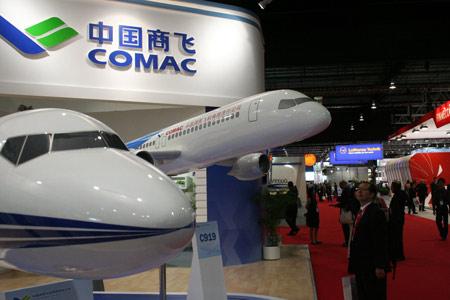
A visitor looks at the C919 aircraft mockup at the Singapore Airshow. [Xinhua]
China's first home-made C919 jumbo jet may receive its first order before the end of this year with three major domestic airlines likely to be the launch customers, Thursday's Beijing Daily reported.
The C919, developed by state-owned manufacturer Commercial Aircraft Corporation of China (COMAC), is a narrow body passenger plane seating around 150 people with the popular Airbus A320 and Boeing 737 as its rivals.
A team working on finding the launch customer of C919 was established on May 18. Deputy director of Civil Aviation Administration of China (CAAC) Wang Changshun and representatives from Air China, China Southern Airlines and China Eastern Airlines all attended the team's conference Tuesday, Beijing Daily said.
The three carriers are the largest airlines in China and believed to be the potential customers of C919.
Beijing Daily said citing an insider that CAAC's involvement will help speed up the negotiation process between COMAC and domestic carriers and the C919 may probably receive its first order during the Airshow China to be held in Zhuhai this November.
Wang Changshun said at Tuesday's conference that the work team is a platform linking COMAC and domestic airlines at which two parties could exchange views on the design, manufacturing and after-sale service of C919, another newspaper the Beijing News reported.
The three domestic carriers all voiced their support to the C919 project at the conference. Wu Guanghui, C919 chief designer and deputy general manager of COMAC, told the Beijing news that COMAC has just began negotiations with the three carriers and orders and prices have yet to be determined.
But Wu, who also attended Tuesday's conference, said the three airlines all expressed their support to COMAC selling the jumbo jet. The chief designer said this March he believed COMAC could sell over 2,000 C919 jetliners and its operating costs will be 10% cheaper than its rivals.
The draft design of C919 will be completed by the end of this year and the jumbo jet will test fly in 2014 and is expected to enter service in 2016.





